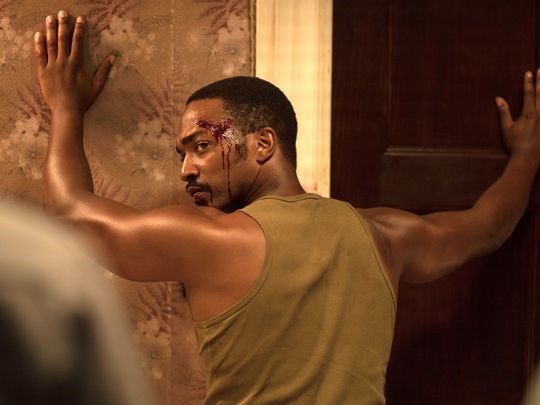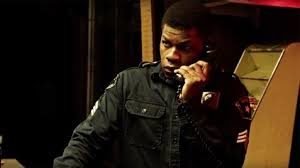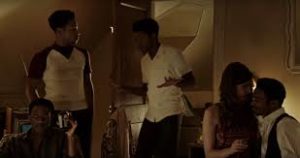A Detroiter Reviews ‘Detroit’: Prepare for a Powerful and Brutal Historical Drama

Full disclosure: Detroit is a movie that hits uncomfortably close to home — and yet, in many ways, is a foreign-language period piece. I grew up in the Southeastern Michigan suburbs in the 1980s. My mom and her family lived downtown in its bustling heyday. And like many other Caucasians, they ultimately uprooted to safe confines outside the city limits. As a child, I learned in a hurry that venturing 30 minutes to downtown Detroit was a dangerous no-no. Perhaps I could go to a daytime Tigers game or the Thanksgiving parade, the end. I never once experienced race-ignited tension living in suburbs with serene-sounding “hills” and “field” in its names. The 1967 riots? I heard about it in passing, almost like a faraway dream impossible to piece together. It was an event that happened a long time ago, before I was born. I never knew the extent of the devastation, let alone what went down at the Algiers Motel.
The Algiers is where several white Detroit cops, believing they heard sniper fire from a window, spent all night harassing the mostly black motel guests. They made up the rules as they went along. Three unarmed men were shot and killed, execution style. Oscar-winning director Kathryn Bigelow (The Hurt Locker, Zero Dark Thirty) takes this understudied, dark snapshot of American history and turns into a searing horror film with deep emotional resonance. The anguish is real as the sweaty-faced madmen wearing police uniforms terrorize the innocents at the motel. Redemption never comes. Bigelow, along with screenwriter and longtime collaborator Mark Boal, refuse to back down at shedding light on the harsh brutality of the disaster. That’s why Detroit is a must-see. That is, if you can bear to physically see it.

Boyega is a witness to the violence (Anapurna)
The four-day riot — which ignited after police officers raided an unlicensed club called the Blind Pig — serves as a table setter. Leading up to the night of hell, an understated grocery store security guard (John Boyega) tries to mediate between locals and the national guard; a soul singer from the Dramatics (Algee Smith), aiming to get a deal with Motown Records, has his hopes dashed when a high-profile gig at the Fox theater is abruptly cancelled; a soldier (Anthony Mackie) has just been honorably discharged from Vietnam; two young white friends (Hannah Murray and Kaitlin Dever) visit from Ohio. On July 25, 1967, they all end up at the Algiers, located a mile from ground zero. They hang out and make out. During a back-and-forth about the riots, a rowdy guest (Jason Mitchell) takes a starter pistol and fires it out the window. Officers and the National Guard hear the shots. They storm in with a vengeance.

The calm before the dreaded storm (Anapurna)
Here’s where the film takes a turn for the harrowing. A racist, trigger-happy police officer (Will Poulter) — remorseless for shooting an unarmed looter in the back — takes charge and leads an intense “interrogation.” Every second feels like an agonizing minute as he and his buddies play sick games in hopes that a guest reveals who unloaded the weapon. He tells them they better pray for their lives and then sadistically mocks them when they obey. He orders each person up to a room for a 1:1 questioning and beating. If they don’t comply, he sneers they’ll get shot in the head. The scenes are powerful; the characters are powerless.
Bigelow is unflinching in her direction; she never even cuts away for an aerial shot. The result is a sense of utter claustrophobia. I felt like I was sweating in that $11-a-night motel. You will too. Indeed, Poulter, best known for playing a virgin TLC-loving dork in We’re The Millers, is so convincing that I find myself hating the guy now. (One quibble: The Brit speaks with a tough-guy Bawston accent. Who was the actor’s dialect coach? Mark Wahlberg?) No matter your socioeconomic background, you can’t not experience an undercurrent of dismay watching the drama unfold and knowing that police wars remain a heated domestic conversation topic 50 years later.

Poulter (left) threatens Mackie (Anapurna)
Still. Once the lens of social timeliness is removed, the film’s flaws become evident. Chief among them: That unwieldy third act. After the horror in the hotel finally and mercifully comes to an end, I was ready for the closing credits and, frankly, a breath of fresh oxygen. A postscript over the closing credits would have sufficed. Instead, we get a tedious Law & Order procedural in which the officers are bound for trial. A well-known comedy actor appears in a distracting bad wig. The extended (and predictable) proceedings somewhat dilutes all the suffering we just witnessed. And considering that Bigelow has a knack for poignant grace notes (see: Jessica Chastain breaking down at the end of Zero Dark Thirty), the drawn-out last chapter disappoints.
And then there’s Detroit. The city, not the movie. Listen closely and you can hear the buzz about whether a white woman — albeit a one with a proven track record — should take the reins of such a racially charged epic. At the premiere, social commentator Michael Eric Dyson took the stage before the screening and dismissed the negativity by declaring “she had the gall and courage to tell the truth about what’s going on.” Fair enough. Personally, I take a bit of umbrage with the fact that Bigelow isn’t a Detroiter. I’ve lived in New York City for 20 years and I still call myself one. I believe you need roots to fully examine the fiber of the city. Despite that title, she never circles back to the streets themselves and illustrates how a city on fire stunted its growth. She gives us zero flashes of civic pride or a coda about downtown’s hard-earned revitalization. We’re just left with sickening, lingering thoughts about that awful night in 1967. Then again, maybe that’s the point.
(Detroit opens in Detroit on Friday, July 28 and in theaters nationwide on Friday, August 4)
Also published on Medium.






